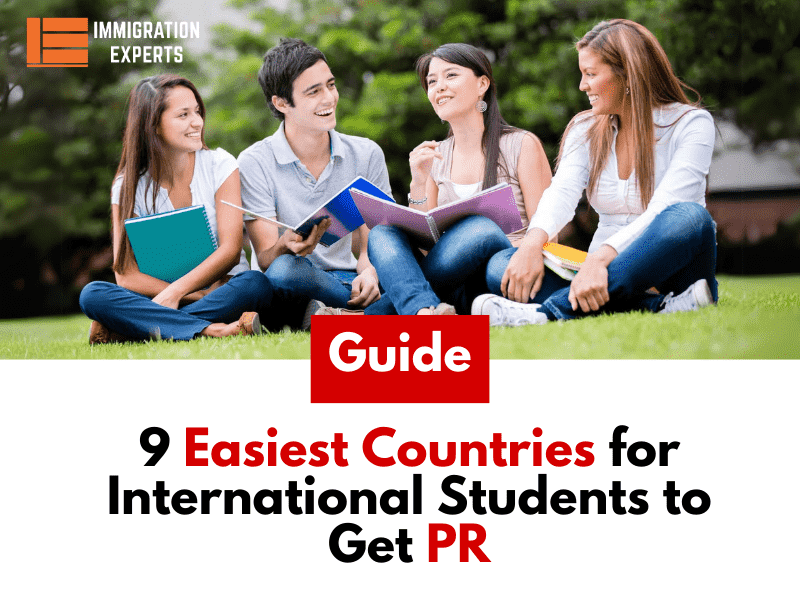051 8439995, 042 35911332

Several countries offer international students the chance to work after graduation and provide clear pathways to permanent residency (PR). By exploring these top PR-friendly destinations and following practical steps, students can navigate the path to permanent residency more effectively, ensuring a smooth transition from academic life to a stable career abroad. These opportunities allow students to remain in their dream countries and achieve significant life milestones.
Things You Will Find In This Page
1. Canada
Streamlined PR Pathways:
Canada has a strong immigration system that includes the Canadian Experience Class (CEC). This program provides pathways for international students to become permanent residents (PR) in Canada. Points are awarded based on Canadian work experience, education, and language skills, making Canada a top choice for those looking to stay after graduation.
Another option is the Federal Skilled Worker (FSW) program, a merit-based immigration program for skilled workers with work experience who wish to become permanent residents. To qualify, candidates must have education, skills, and proficiency in English or French.
Additionally, the Provincial Nominee Programs (PNPs) cater to applicants with connections to a province, such as previous studies or work experience there, giving them an advantage in the PR process.
The Quebec Experience Program (PEQ) offers a pathway for students who have completed their studies or are close to completion at a Quebec institution. It also applies to foreign workers aged 18 and above who legally reside in the province and can speak French. Applicants must provide proof of study or work in Quebec.
The Quebec Skilled Worker (QSW) program is an alternative for students in Quebec who have finished or are in the process of completing their educational qualifications. Applicants must apply for a Quebec Selection Certificate (CSQ) from the provincial government. Those who qualify receive the certificate and can become permanent residents.
A post-graduation work permit allows most international students who have graduated from a designated learning institution (DLI) to stay in Canada and work for any employer.
2. Australia
Under the SkillSelect model, the Department of Home Affairs invites skilled workers to apply for a Skilled Independent visa (subclass 189) based on their expression of interest (EOI).

Applicants must fulfill most criteria outlined in the points test at the time of invitation. The SkillSelect system is points-based, awarding points for criteria such as age (up to 44 years) and work experience. To be eligible for the visa, applicants must score at least 60 points.
Candidates can calculate the points free online to check if they score enough points for their visa.
By understanding and leveraging these opportunities, international students can successfully transition from studying to establishing a permanent and fulfilling life in their chosen country.
3. New Zealand
Skilled Migrant Category (SMC) Visa:
New Zealand provides the Skilled Migrant Category (SMC) visa, which operates on a points-based system taking into account work experience, qualifications, and age. This visa permits international graduates to reside and work in New Zealand, opening the path to obtaining permanent residency.
International students are eligible to apply for this visa if they are currently employed or have received job offers from recognized employers and meet the required points threshold. They must submit an Expression of Interest (EOI) form. If their EOI is accepted, they will receive an invitation to apply for the visa.
Applicants should be no older than 55 years. The application fee for this visa is $4290 (approximately $2,627).
4. Germany
Job Seeker Visa for Graduates:
Germany’s strong economy and demand for skilled workers create excellent opportunities for international graduates. The Job Seeker Visa enables students to remain in Germany for a duration of up to 18 months post-graduation to seek employment, aiding in the process of transitioning to permanent residency.
To qualify for a German job seeker visa, you must meet certain criteria:
- You need to have finished a training course or a study program in Germany.
- Hold a degree from Nigeria that is equivalent to one in Germany.
- Have a degree recognized in Germany.
- Possess at least five years of professional or academic experience.
- Prove you have enough financial resources to cover expenses while in Germany.
- Have completed vocational training and can show proof of German language proficiency.
5. Sweden
Residence Permit for Work:
Sweden provides a residence permit for work. After residing and working in Sweden for four years, international students become eligible to apply for permanent residency. This feature makes Sweden an appealing choice for those seeking long-term career development opportunities.

To obtain a work permit, you must:
- Have employment in Sweden and an employment contract, which must be included with your application. If the contract is not in English or Swedish, it needs to be translated, and a copy of the original document must also be provided.
- Have a valid passport.
- Ensure the terms of employment are at least on par with those set by Swedish collective agreements or customary within the occupation or industry.
- Have employment that enables you to earn a good income. This means having a monthly salary that amounts to at least 80 percent of the median salary published by Statistics Sweden (SCB) and is valid at the time of application.
Interested persons must apply to Sweden’s immigration authority.
By understanding and leveraging these opportunities, international students can successfully transition from studying to establishing a permanent and fulfilling life in their chosen country.
6. Netherlands
Knowledge Migrant Visa:
The Netherlands offers a knowledge migrant visa for highly skilled workers, particularly in science, technology, engineering, and mathematics (STEM) fields. International students with relevant qualifications can take advantage of this visa to secure permanent residency after their studies.
Highly skilled migrants are professionals with advanced training who come to work and live in the Netherlands, such as physicians in training or scientific researchers. Employers must meet certain conditions, including having an employment contract with the employee or research institution in the Netherlands and proving that the employee will earn sufficient income according to market conditions.
To apply for a residence permit for a highly skilled migrant, the employer must be recognized by the Immigration and Naturalization Service (IND) as a sponsor.
7. Denmark
Work-Based Residence Permit:

Denmark’s system enables international graduates to seek a residency permit for employment purposes. After residing and working in Denmark for a few years, students can qualify for permanent residency, facilitating a seamless transition from studying to working life.
Applying for a Danish work visa can be completed online through SIRI (Danish Agency for International Recruitment and Integration). Several schemes are accessible, including the Pay Limit Scheme for high-earning individuals and the Fast Track Scheme for those with offers from accredited companies, which expedite the recruitment process and offer flexible permits.
By understanding and leveraging these opportunities, international students can successfully transition from studying to establishing a permanent and fulfilling life in their chosen country.
8. France
Temporary Residence and Talent Visa:
France offers a temporary residence permit for recent graduates. This permit can be changed into a work permit once you find a job.
Moreover, there’s a talent visa for highly skilled workers in specific fields. It provides a way to permanent residency.
The “passport talent” residence permit lasts for multiple years and aims to enhance France’s economic appeal for foreign employees and self-employed individuals. To qualify, your employment contract and stay in France must be longer than three months. It permits a stay of up to four years starting from your arrival date in France.
Your family members can join you and will receive multi-year residence permits. Spouses and children under 18 can work with this permit. Within three months of arriving in France, you and your family must visit your local police station to request a multi-year residence permit that fits your situation.
9. Singapore
Start-up Visa Programmes:
Singapore offers two programs, the Global Investor Programme and the Start-up Visa Programme, tailored to entrepreneurs and investors. International students keen on launching businesses can leverage these initiatives to secure permanent residency.
Students must gain relevant work experience in the host countries to significantly enhance their PR application. Networking is also vital, as it can lead to job opportunities and valuable references.
Therefore, students can engage in industry events, join student organizations, and connect with professionals in their fields. Staying updated about immigration policies is equally important due to frequent changes.
Some students boast excellent academic records, which can bolster their profiles for both job opportunities and PR applications. Additionally, involvement in research or projects related to their fields can be beneficial.
It’s noteworthy that some countries offer additional PR points or easier pathways for individuals willing to reside and work in regional or less-populated areas. Hence, exploring these options is advisable.
The pass’s key features include:
- Flexibility to establish and run a business in Singapore.
- Availability of passes for eligible family members.
- No requirement for foreign worker levy or quota.
